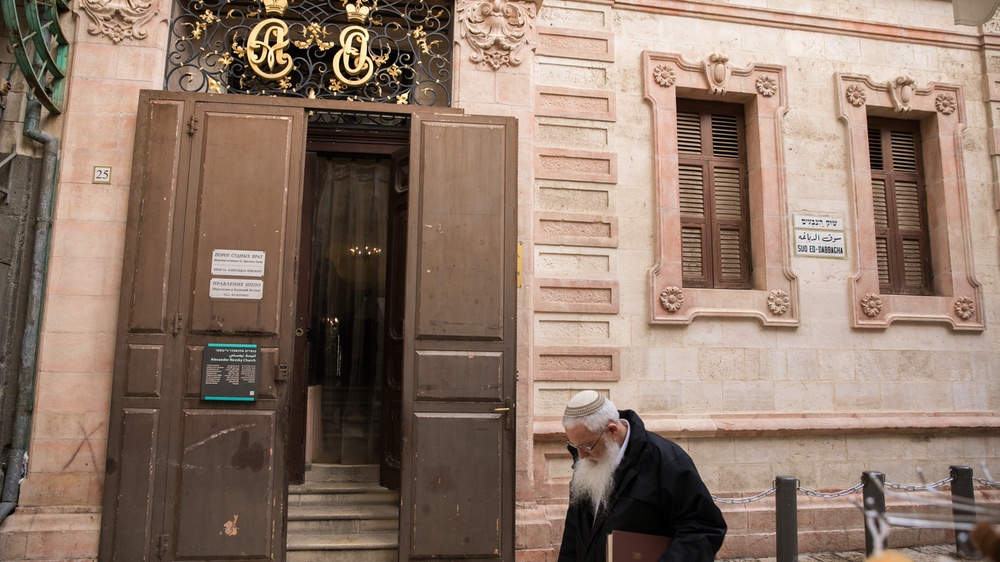Who Really Owns Jerusalem, and Does It Even Matter?
When Israel handed a local church over to a body representing the Kremlin, it rekindled concerns over who really controls the Holy City

The transfer of ownership over a church property in Jerusalem’s Old City to an organization representing the Russian government sparked something of an uproar in Israel.
But ultimately, it was a tempest in a teacup.
The Alexander Courtyard is situated adjacent to the Church of the Holy Sepulcher and contains among other structures the Alexander Nevsky Church. The strategically located parcel of land was purchased in 1859 by Czar Alexander II. After the Russian Revolution in 1917, two organizations claimed ownership of the land, the Imperial Orthodox Palestine Historic Society and the almost identically named Imperial Orthodox Palestine Society, the latter of which is connected to the Kremlin.
For years, the Russian government has been urging Jerusalem to settle the dispute once and for all by making official the Imperial Orthodox Palestine Society’s ownership of the Alexander Courtyard, which Israel finally did in 2020.
In other words, there was never any question that one or another Russian organization owned the property, but rather which organization.
And the fact that Israel was called upon to settle the dispute can be seen as a diplomatic achievement in that it implicitly recognizes the Jewish state’s sovereignty over Jerusalem’s Old City and its holy places.

Sovereignty or property rights?
Even so, this episode rekindled concern over the fact that much of the land in Jerusalem is owned by churches, some of them connected to or even controlled by foreign governments.
“It’s a situation going back to the 19th century. This isn’t a new issue,” explained Dr. David Gurevich, an expert on the history of Jerusalem and Israel-Church relations. “There are churches that have their headquarters in Jerusalem. For instance, the Armenian Patriarch of Jerusalem. And there are many churches that since the 19th century decided to purchase property and build in Jerusalem.”

Dr. Gurevich holds a PhD in Archaeology and previously worked as the officer-in-charge for the City of Jerusalem on diplomatic ties with the Christian institutions. He told Israel Today that the current paranoia characterizing some reports and commentary on this topic is unfounded.
“I wouldn’t say that foreign powers are suddenly controlling Jerusalem. It’s not as if someone is going to take the city from us,” noted Gurevich.
Still, he did acknowledge that so many hands in the pot called “Jerusalem” certainly does complicate diplomatic efforts concerning the Holy City’s future.
“If we are talking about geopolitical concerns within the Old City of Jerusalem, at the moment there are more and more foreign players involved, and that complicates the matter of reaching any kind of understanding between Israel and the Palestinians because everyone has his own interests,” Gurevich said. “But in most cases regarding these churches, we are not talking about sovereignty, but rather property rights.”

Political pressure, not leverage
According to Dr. Gurevich, no foreign power is going to try to leverage church properties in Jerusalem in service to a particular outcome in the Israeli-Palestinian peace process.
At the same time, the fact that these properties are so tightly connected to some foreign governments often translates into political pressure on Israel, as in the case of the Alexander Courtyard.
To give but one example, Dr. Gurevich cited a recent dispute at the Church of the Holy Sepulcher, which is partly controlled by several Orthodox churches.
“When the Coptic Church and the Ethiopian Orthodox Church scuffled over control of the Church of the Holy Sepulcher, there was pressure on Israel to get involved and ‘bend’ the status quo for one of the parties,” he recalled. “It was a very unpleasant situation [that started out having nothing to do with politics]. A stone fell from the roof of a chapel in the Holy Sepulcher. The problem was that this particular chapel is under continuous dispute between Ethiopians and Copts. The collapse represented a danger to the public because of safety, so the Jerusalem Municipality closed the entrance to the chapel until repairs could be made.”
Seems like a rather simple matter. But this is Jerusalem, where nothing is simple.
“The question arose, to whom does the municipality turn to conduct the repairs?” Gurevich told us. “Approaching the Copts would be tantamount to recognizing their authority over the holy site, just as turning to the Ethiopians would have acknowledged their dominance. And so the matter became political to the extent that the Israel Foreign Ministry was being pressured by foreign powers. All because a stone fell from the roof.”
The Jerusalem expert concluded by reminding us that “ultimately, any issue related to holy sites [in the Holy City] is going to involve politics and international relations.”
No comments:
Post a Comment